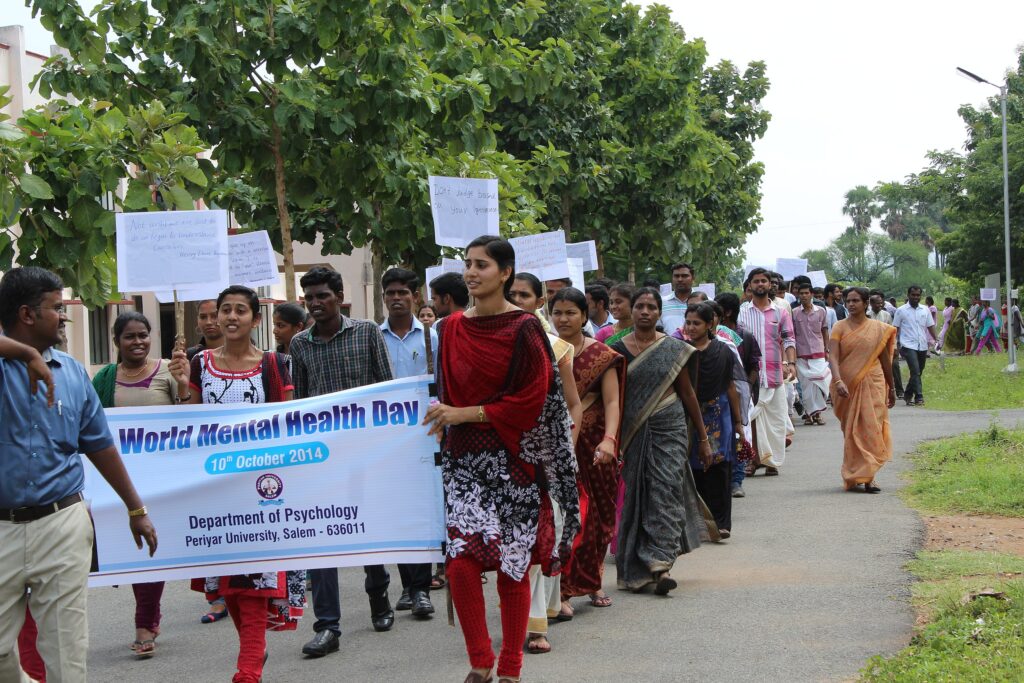
Credit: Chinchu.c – CC BY-SA 4.0
According to the World Health Organization, nearly a billion people worldwide have experienced some form of mental illness. This includes an estimated five percent of adults who experience depression, one in seven 10-19-year-olds who have experienced a mental health condition, and suicide being the fourth leading cause of death for young people aged 15-29 years. And people with severe mental disorders such as schizophrenia tend to die 10-20 years earlier than the general population.
On October 10, the world celebrated World Mental Health Day. For this episode of the podcast, we talk to two experts who have devoted their lives to global mental health. Vikram Patel, MD, is a professor of global health at the Harvard University Chan School of Public Health. In April 2015, he was listed as one of the world’s 100 most influential people by TIME magazine. Fran Silvestri has been the director of the International Institute of Mental Health Leadership since the organization’s inception 20 years ago.
Global Mental Health: For All, By All
Vikram Patel insists that, for all the heterogeneity of human cultures, mental health is a cross-cultural phenomenon. For Dr. Patel, the cause of global mental health is captured in a simple phrase: mental health care for all, by all. Making good on that slogan will take a paradigm shift that has implications for both diagnosis and treatment.
“Well, in a nutshell, it simply means that global mental health is far too important to be left to mental health professionals,” says Dr. Patel. “I think the science tells us very clearly that the narrow biomedical approach that has dominated mental health care in recent years—in fact, I would say, for much of the last three or four decades— is not in fact a tenable approach because mental health can best be described as a dimension, rather than as binary categories of diagnoses or cases.”
As we’ve previously explored on the podcast, getting beyond a narrow clinical framework requires a focus on early intervention and prevention that doesn’t currently exist. The realization that mental health involves a continuum of care, with intervention points all along the path, has been slow in coming.
“This means that there is a potential role for a much wider range of providers,” says Dr. Patel. “Indeed, starting with a person themselves in terms of self-care, but moving on to people who are in community settings who might be able to support those who are having early signs of difficulties with mental health.”
Global Leadership for A Global Crisis
A global crisis needs global leadership, and when it comes to global mental health good eadership is in dear supply. The most recent edition of the World Mental Health Organization’s Mental Health Atlas highlights a number of unmet goals for WHO member nations. As described by WHO, the Atlas “paints a disappointing picture of a worldwide failure to provide people with the mental health services they need, at a time when the COVID-19 pandemic is highlighting a growing need for mental health support.”
One particular challenge that Fran Silvestri and the International Institute of Mental Health Leadership (IIMHL) seek to address is the lack of time leaders have to connect with others outside their circles. Through its nine participating countries and annual leadership exchanges, the IIMHL provides a single international point of reference for mental health, addiction and disability leaders and exposes them to recent developments in the field.
“It began when I was running a community mental health center in the state of New Hampshire, in a town called Keene,” says Fran. Over his 25 yes at the center, he grew to appreciate the value of leadership development for his staff. “We instituted a sabbatical leave policy for all my staff, an opportunity every five years to take three months off with pay. So we had staff in a variety of locations—Europe, Asia, South America, and also Canada and North America.”
The goal was twofold: to learn about innovative practices around the world, including approaches to treatment that had not yet hit the mainstream, and co-mentoring with other leaders. Fran gives as an example an emergency services director who spent three months shadowing his counterpart in Alberta, Canada, learning lessons about rural service delivery that he could take back home. Fran says that once this collaborative ethos was established, it took on a life of its own that would eventually seed the beginnings of the IIMHL.
“What happened is that colleagues in an association called Mental Health Corporations of America heard about these linkages we had, and they want to experience the same kind of things that we learned by sending staff and leaders overseas in particular,” says Fran. “And so in 2002, we started developing the concept of setting up a place where leaders could go to find colleagues from overseas and within the states, to rapidly build a partnership and collaboration so that they could become more effective leaders.” This contrasts with the years it can take to add qualifications and credentials within a standard practice in the U.S.
Fran Silvestri is the IIMHL’s first, and so far only, director. He’s a few months away from stepping down. The IIMHL has managed to build a successful model of an experiential learning community for mental health leaders while also bringing fresh perspectives to bear on such challenging issues as rural mental health, indigenous mental health, and reducing the use of seclusion of restraint in treatment settings. The Hogg Foundation is a member of the IIMHL’s rural collaborative.
“We have about 5000 members, and when I have a leadership exchange or I’m in Washington with a group of leaders, I find that sometimes I have to pinch myself,” says Fran. “Because I look at 20 or 30 people and they’re all my friends, and they’re all people with immense passion who basically have made major changes, and I just sit there thinking that I’ve been able to put them together. I love that.”